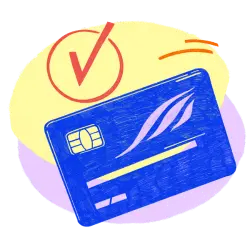Every business owner who accepts card payments has to deal with processing fees at one point or another. However, an unwanted abundance of credit card fees can damage your business’s profit margins. Thankfully, there are options for small businesses designed to help deal with those types of fees—specifically zero-cost credit card processing.
Below, we’ll explore the pros and cons of no-fee credit card processing, the business types supported by this practice, and the hurdles some merchants may encounter along the way. Let’s dive in.
Zero-Cost Credit Card Processing: What Is It?
Zero-cost credit card processing, also referred to as “no-fee credit card processing” or “free credit card processing”, is what its name implies: reducing transaction-based fees by having the customer absorb the cost. It bears mention that there are still fees associated with this form of processing, which is why some find these names misleading. While passing along fees to customers has proven to be divisive in some circles, plenty of businesses offer this option.

How No-Fee Credit Card Processing Works

Credit card processing involves interchange and assessment fees and the possibility of chargebacks. Zero-fee credit card processing occurs when these fees and others are passed on to the cardholder through surcharging. Surcharging refers to an added cost within a transaction meant to cover processing fees. In practice, this means that customers can either pay via credit card at a more expensive price point or complete the transaction with cash at the previously agreed-upon price.
Alternatively, merchants can also set up a cash discount program, meaning customers will enjoy a lower price on certain purchases should they opt to pay with cash. Since most American consumers prefer to pay with a card for in-person transactions, there is a limit to the appeal of the cash discount.[1]Capital One Shopping Research. “Cash vs Credit Card Spending Statistics.” Accessed on September 25, 2024. However, it is still known to make a difference for merchants wishing to offer their customers markdowns on specific goods or services.
Seen a certain way, cash discounts are the inverse of surcharging. Surcharging tends to raise the cost with added fees. A cash discount means you know exactly what you’re paying for and the final total. Dual pricing is also something to consider in this regard. Rather than offering a discount for cash payments or a slight transactional increase for card-based payments, dual charging offers “cash price” and “card price” options. In other words, dual pricing allows for greater transparency.
Pros and Cons of Zero-Cost Credit Card Processing
The terms “zero-cost”, “no-fee” and “free” hold obvious appeal to merchants seeking to lower processing costs. However, this approach has advantages and disadvantages.
Here are the pros and cons of free credit card processing:
Pros
- Cash Payments. Using cash to pay for goods and services is pretty rare these days, but promoting cash payments can benefit your business in some situations. It might also encourage your customers to consider the lasting value of using cash instead of cards.
- Pricing Transparency. While a merchant account remains necessary for today’s business owners, it almost always comes with a litany of added charges. Zero-cost processing means you know what you’re paying for and why.
- Reduced Processing Fees through Surcharging. Through surcharging, business owners can transfer processing fees to their customers.
Cons
- Credit Card Premium Costs. Let’s be honest: consumers want to avoid paying out-of-pocket for expensive card-related costs. In that way, compelling your customers to pay the processing fees themselves can seem like a counterintuitive tactic. After all, many customers will not be enthusiastic about the prospect of paying these charges themselves. With that in mind, ensure you offer customers enough reason to stay so they don’t take their business elsewhere.
- State-Specific Surcharge Laws. Laws regarding surcharging vary from state to state. In some states, surcharging is illegal. Merchants must perform their due diligence and research thoroughly before committing to a business plan and moving forward.
Is Free Credit Card Processing Really Free?
Credit card processing fees are a factor that many business owners must consider when it comes to controlling their bottom line. Even the seemingly simple act of maintaining a merchant account comes with its own set of costs. Whether paying for equipment or entering into a yearly service fee for processing services, these responsibilities can be a significant burden for any merchant.
Really, no payment solution is ever 100% free. Even surcharging technically involves passing along fees to your customer base. While you may not be paying these costs, someone else is. Although free credit card processing is, in some ways, an attempt to offset fees, it is not possible to eliminate them entirely. There are also PCI compliance fees to consider, so budget accordingly.

How To Combat Fees with Surcharging
For most merchants, the cap on surcharge fees stands at 4%.[2]Fortune Recommends. “What are credit card surcharges and where are they legal?” Accessed on September 25, 2024. Let’s use an everyday example to illustrate how this plays out in practice. If you and a friend have lunch and your half of the bill costs twenty dollars, a 4% surcharge would add $0.80 to the total, bringing the final sum to $20.80. This surcharge is added to the final amount if the customer chooses to complete the transaction with a credit card.
Merchants can also consider options for manual surcharging. As its name implies, manual surcharging involves manually entering information into a point-of-sale system. Merchants should exercise caution and good judgment when navigating the nuances of surcharges, especially considering that they remain a somewhat controversial issue and one that certain states are tougher on than others.
Legal Requirements For No-Fee Card Processing
No matter how you choose to embark on your processing journey, complying with state law is a non-negotiable part of the process. In certain states, such as Massachusetts and Connecticut, imposing surcharges on credit card transactions is against the law. Merchants must follow all requisite regulations to avoid legal trouble.

For those who live in a state where surcharging is not legal, we recommend looking into a cash discount program as an alternative. Cash discount programs are legal in all fifty states. Do your homework, as adequate preparation will offer a more comprehensive and complete understanding of the state’s processing laws. Staying up-to-date with these regulations will help your business thrive in the long run and ensure standard legal compliance.
Below is a list of North American states where limitations have been set regarding passing card transaction fees to customers. If you operate in one of these states, we advise familiarizing yourself with these limitations.
- California
- Colorado
- Connecticut
- Florida
- Maine
- Massachusetts
- New York
- Texas

Industries Supported by Zero-Cost Credit Card Processing
Specific industries may be more inclined to utilize zero-cost processing options than others. Food trucks are one example. Until recently, a decent number of these businesses existed as cash-only operations, thus making them a natural fit for cash discount programs. Boutique shops offer yet another example. At boutique retail outlets, customers are often willing to pay higher prices for items, thus driving profits and overall revenue.
It bears repeating that surcharges are limited exclusively to credit card transactions. In other words, surcharging does not apply to debit, cash payments, gift card payments, or other alternative payment methods. Upon determining whether or not their business is eligible for surcharging, merchants must notify their card provider in writing about their intent to implement surcharging with thirty days advance notice.[3]LawPay. “Credit Card Surcharge Laws by State Explained.” Accessed on September 25, 2024.
Saving Money on Credit Card Processing
We encourage merchants looking into credit card processing options to get familiar with the ins and outs of processing jargon. It is also imperative that business owners ask certain questions. What level of processing do you qualify for? How will your business deal with MOTO payments? Knowing the answers to these questions will help you save on costs and ultimately guide you toward the right decision for your business.
No-Fee Credit Card Processing and Your Business: Closing Thoughts
Whether you opt for surcharging or a cash discount program, zero-fee credit card processing can benefit your business under the right circumstances. Above all, it’s about researching, looking into state and local regulations, and knowing both what your customer base wants and how they spend their money.
Making the correct, informed decision is critical for businesses. We encourage merchants to partner with a credit card processing provider with an established track record of helping businesses like yours. Partnering with a provider who has your back will take your processing capabilities to the next level—there’s never been a better time to start your journey.
FAQs
Does my business qualify for zero-cost processing?
The answer to this question varies on a case-by-case basis. For instance, if you live in Massachusetts and wish to add surcharging to your business, you are unfortunately out of luck. However, cash discount programs remain legal in all fifty states.
What is the difference between a cash discount program and surcharging?
Cash discounts and surcharges are fundamentally different. Cash discounts incentivize customers to pay with cash via lower-than-usual prices. Surcharging means that customers will pay another fee on top of the additional price. As mentioned earlier, surcharging does not apply to payments made with cash or debit cards. Be sure to look into state-specific laws related to cash discounts and surcharging before settling on one of these options.
Can I pass on processing fees to my customers?
Yes, under the appropriate circumstances. Your customers may not necessarily be thrilled at the notion of paying additional processing fees on top of their initial purchase cost. If you compete with businesses that don’t compel their customers to absorb transaction-based fees, these same customers may take their business elsewhere. Offering your patrons incentives for staying loyal to your business may turn out to be an integral part of your business strategy.
How do I stay compliant with surcharging laws?
Surcharge laws differ from state to state. Some states have banned it entirely. To determine whether or not this strategy will work for you, conduct the appropriate research on your home state and its surcharging laws. Adhering to the rules will help keep you from incurring legal penalties.






